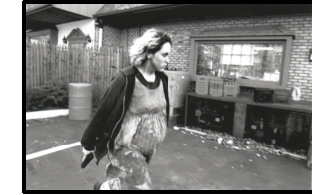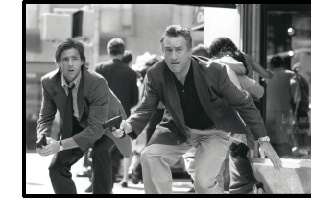
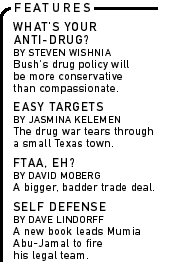
|
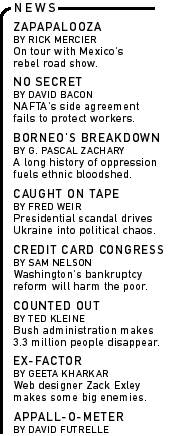
|
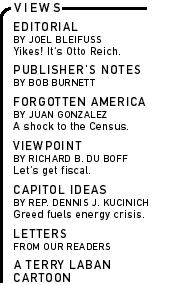
|
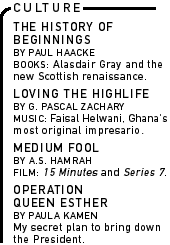
|
| |
|
|||
|
15 Minutes Series 7
TV can be good in small doses. Hell, in small doses it can be great. But people don't shell out 8 or 10 bucks a pop for TV. Projected on a big screen, heard through state-of-the-art speakers, viewed from stadium seats amidst the drone and chirp of teen-agers, the last thing anyone wants to see in a movie theater is more of the factory programming that cable unloads for pennies on a hundred channels 24 hours a day. TV's heightened notion of a lower reality is no match for the movies' too often lowered notion of a heightened reality, yet that doesn't make the BattleBots-ified, Survivor-ized world of TV programming any less enjoyable. It just isn't a night out. It's an evening that's called it a day. So when the movies give themselves over to TV aesthetics and films begin to pass
messenger-is- dressed approach to debunking the video manipulation of reality that makes for the most compelling stuff on TV today. Too bad their writer-directors have confused reality with reality programming. They've produced airtight, bloody episodes of Regis Philbin's eerie twilight zone of a gameshow, Who Wants To Be a Millionaire?, with not a lifeline to be found, all the lifelines having been disconnected to pay the cable bill. 15 Minutes is a pumped-up episode from a mismatched buddy-cop show directed by John Herzfeld in the style of his sour-noir 2 Days in the Valley (he likes numerals in his titles). The plot borrows heavily from Henry: Portrait of a Serial Killer and Man Bites Dog, lower-budgeted movies that came out 10 years ago, and it has the dark, brooding qualities of those films with none of their insight or horror. 15 Minutes follows Robert De Niro around in scenes left over from Backdraft; it's as technically sophisticated and unimaginative as Ron Howard at his best. Kelsey Grammer is in it too as some kind of Geraldo Rivera type, but the potential fun of seeing De Niro and Grammer acting together--James Cagney meets Jack Benny, maybe--is lost in the murk. De Niro, anyway, spends most of his time with Edward Burns, cinema's answer to Melrose Place's Andrew Shue, or Melina Kanakaredes from the TV show Providence, who in her scenes as De Niro's TV-reporter girlfriend seems more like a daughter who's indulging him sweetly, even though the birthday present he just gave her came from the perfume counter at Eckerd's. The question of why De Niro is in this picture at all isn't answered in his performance as a New York homicide detective so improbably famous he routinely lands on the cover of People. He smartly checks out early, sparing himself from further degradation in scenes that unwisely recreate moments from Scorsese's Taxi Driver and King of Comedy, films that had both De Niro and something to say on the themes Herzfeld pretends to tackle here. And what are those themes? Celebrity, celebrity crime, an intrusive celebrity mediascape in which--get this--"perception is reality." Someone says that in the film, evidently turning their perception into your reality with nothing more than an ali kazam. For the rest of the film they ball-peen it into your skull. What happens is two crazy nuts come over from Eastern Europe and start killing people, all the while recording their murders with a video camera. Footage of their spree is broadcast on the big TV screen in Times Square, and they get the idea they can escape prosecution with an insanity plea. The more dominant of the two, a Czech played by Czech actor Karel Roden, is so intense that when he smokes he looks as if he's about to eat his cigarette like it's a wasabi pea. The actorly reality-effect he achieves is like David Spade doing an impression of Tim Roth under torture. Herzfeld has named Roden's character Emile Slovak. Similarly, Burns' character, a goody-goody fire marshal whose parents were from Poland, is named Jordy Warsaw. Meanwhile, the film continues with a running joke about how nobody recognizes the name Frank Capra. (It figures it wouldn't occur to a guy who gives his characters names like Slovak and Warsaw that it might be injudicious to use the name of the immigrant filmmaker Capra to insult would-be immigrant filmmakers who might be watching his own movie.) 15 Minutes then tendentiously points out that the ultimate in screen realism, the snuff film, is now within the grasp of anyone with a video camera. The Cain-and-Abel relationship of video to cinema that Godard recognized early on becomes a plea for Hollywood cops to throw away their tin badges and kill your television vigilante-style. 15 Minutes really believes in the power of TV to define experience for each and every one of us, and somewhere beneath that it believes Eastern Europeans have bad taste, they're very emotional, if they're women they're whorish, they like leopard prints, they think Americans are dumb and weak, and they say comical things like "the silence of the sheeps" when they mean "lambs." But it's pretty clear it's the audience who the filmmakers think are the sheeps here. Series 7 is a much smarter film, although it too gives in to a predictable, TV-based despair. Combining plot elements from Elio Petri's 1965 Italian sci-fi film The Tenth Victim (in which Marcello Mastroianni is pursued most-dangerous-game-style by pretty assassins in a future of government-sponsored death hunts) and Peter Watkins' amazing, harrowing 1971 film Punishment Park (where counterculture dissidents are death-marched through the American desert and hunted by National Guardsmen instead of being jailed), Series 7 (numbers again, they're so dehumanizing, don't you think?) puts its reality-based TV gameshow The Contenders on the screen exactly as if it were an episode from a reality-based TV gameshow, instead of The Running Man. The premise is that contestants are selected in a nationwide lottery to appear on The Contenders, then armed with Glocks and sent out to do each other in wherever they happen to be: home, mall, golf course, hospital. If they keep up the body count and stay alive, eventually they'll win money. This slice-of-mediated-life was written and directed by Daniel Minahan, who co-wrote
Series 7 does have a beautiful, hilarious scene that stands out. It's a parody of the kind of video that high-school art students might have made in the '80s, a new-wavey project scored to Joy Division's "Love Will Tear Us Apart." It features Smith and another Contender who just happens to have been her high school boyfriend. He's now a sexually confused lousy artist stricken with testicular cancer. In the video they romp around their suburban town, engaging in New Romantic poses copped from the album covers of English synth acts. (Cancer of the testicle, by the way, is a movie trope now, like in Fight Club; as is the shot of the head in the toilet seen from the bottom of the bowl that Series 7 shares with 15 Minutes.) Later, the Joy Division song is blared from speakers in their high school stadium as these last two Contenders face each other in the inevitable showdown that pits human feeling against the demands of television content. But the reprise of "Love Will Tear Us Apart" ruins the earlier scene. It trivializes something that was touching because of how trivial it was. Did Minahan mean to show how TV can ruin memories by misappropriating them and making them into over-determined, Mickey-Moused background music? Who can say for sure? Minahan mingles so thoroughly with the object of his scorn that he can't separate from it. Series 7 never cracks, it's true. His film may be revenge for all the segments he had to produce for tabloid-TV news magazines earlier in his career, but those spots take their revenge on him as well: His movie just looks like a TV show, and it doesn't have the virtue of being ephemeral. It bears the burden of satirizing something that's already a joke. Television, which has been described by the media theorist Jeffrey Scheuer as inherently conservative, is now far in advance of the American cinema as seen in the multiplex. For some reason, reality-TV--and who needs a list of shows?--is forcing the Hollywood cinema into a weird, reactionary position in which it thinks its only defense, its only hope to maintain interest, is to absorb TV techniques and blow them up to 35 mm. But TV moves too fast. The movies have been trying since the '80s, but they can't keep up. That, as Drew Barrymore said in Charlie's Angels, is called kicking your ass. Movies need to do something else now. As we move into a period
when the differences between TV and cinema are harder and harder
to figure out, that's the only real hope the movies have. But do
the people who make them even want that, or do they just want the
same kind of fame that's canted in 15 Minutes and gibed with
so much knowing skill in Series 7? If that's what it's come
to, you're better off watching cable with the lights on. A.S. Hamrah writes for Hermenaut and Suck.com.
|


